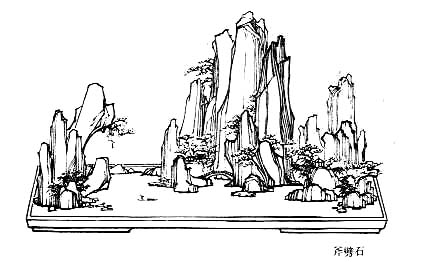論
語
Lun Yu 
 – The Analects of Confucius
– The Analects of Confucius
The Master discusses with his disciples and unveil his preoccupations with society. Tr. Legge (en), Lau (en) and Couvreur (fr).
Lunyu XII. 20. (313)
The man of true distinction, and the man of true notoriety.
1. Tsze-chang asked, "What must the officer be, who may be said to be distinguished?"
2. The Master said, "What is it you call being distinguished?"
3. Tsze-chang replied, "It is to be heard of through the state, to be heard of throughout his clan."
4. The Master said, "That is notoriety, not distinction.
5. "Now the man of distinction is solid and straightforward, and loves righteousness. He examines people's words, and looks at their countenances. He is anxious to humble himself to others. Such a man will be distinguished in the country; he will be distinguished in his clan.
6. "As to the man of notoriety, he assumes the appearance of virtue, but his actions are opposed to it, and he rests in this character without any doubts about himself. Such a man will be heard of in the country; he will be heard of in the clan."
Legge XII.20.
Tzu-chang asked, 'What must a Gentleman be like before he can be said to have got through?' The Master said, 'What on earth do you mean by getting through?' Tzu-chang answered, 'What I have in mind is a man who is sure to be known whether he serves in a state or in a noble family.' The Master said, 'That is being known, not getting through. Now the term "getting through" describes a man who is straight by nature and fond of what is right, sensitive to other people's words and observant of the expression on their faces, and always mindful of being modest. Such a man is bound to get through whether he serves in a state or in a noble family. On the other hand, the term "being known" describes a man who has no misgivings about his own claim to benevolence when all he is doing is putting up a facade of benevolence which is belied by his deeds. Such a man is sure to be known, whether he serves in a state or in a noble family.'
Lau [12:20]
Tzeu tchang demanda à Confucius ce que devait faire le gentilhomme pour mériter d'être appelé illustre. Le Maître dit : « Qu'appelles-tu homme illustre ? » Tzeu tchang répondit : « Celui qui a du renom dans son pays et dans son clan. » Le Maître reprit : « Celui-là a du renom, Il n'a pas une gloire véritable. Un homme illustre est droit par nature et épris de justice. Il fait attention aux paroles qu'il entend, et il observe l'air du visage. Il a soin de se mettre au-dessous des autres. Il est illustre dans son pays et dans son clan. Un homme qui a seulement du renom revêt une apparence de vertu, que ses actions démentent. Il se flatte d'être vertueux et s'en tient assuré. Il a du renom dans son pays et dans son clan1. »
Couvreur XII.19.
有名人ではあっても、必ずしも達人ではない。

The Analects of Confucius – Lun Yu XII. 20. (313) – Chinese on/off – Français/English
Alias the Lunyu, the Lun Yü, the Analects, les Entretiens du maître avec ses disciples.
The Book of Odes, The Analects, Great Learning, Doctrine of the Mean, Three-characters book, The Book of Changes, The Way and its Power, 300 Tang Poems, The Art of War, Thirty-Six Strategies
Welcome, help, notes, introduction, table.
Index – Contact – Top























